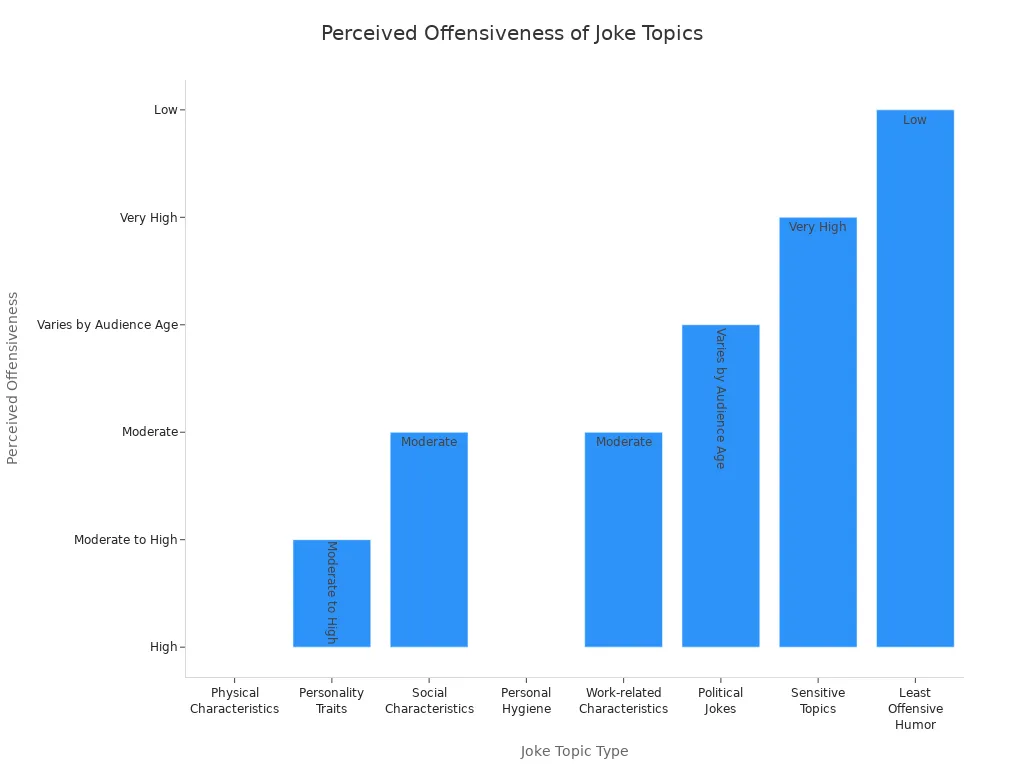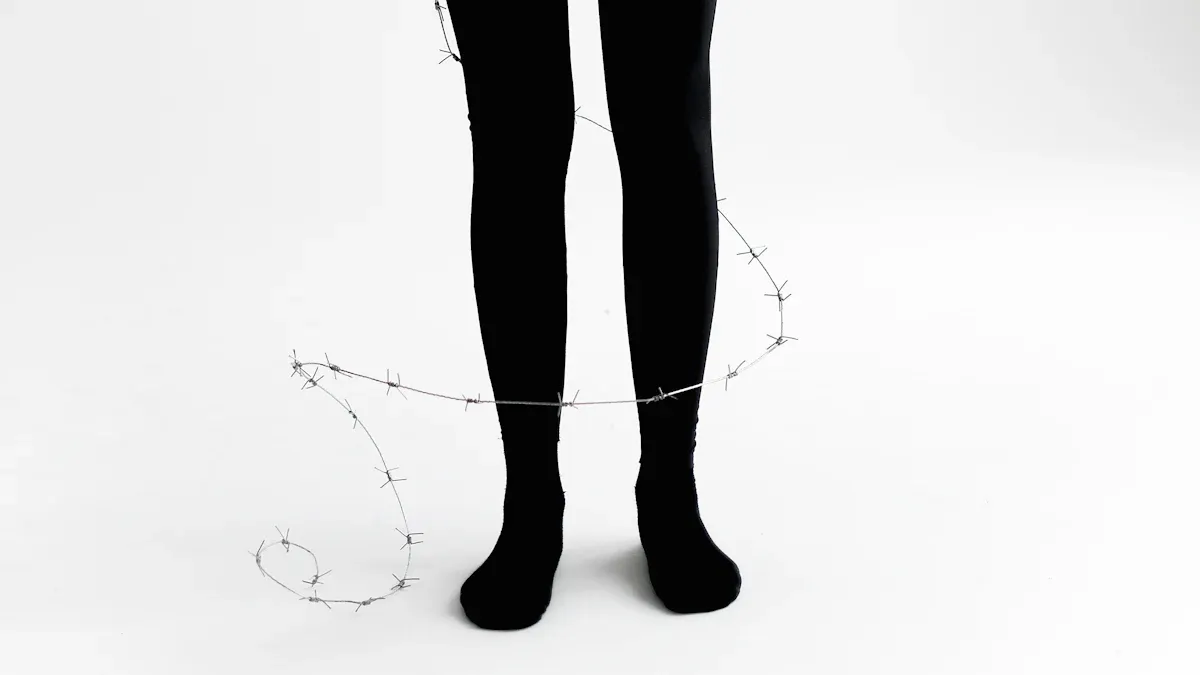Addressing harmful jokes and setting boundaries

You sit with friends or coworkers when someone cracks a joke. Laughter fills the room, but you feel a sting inside. Maybe you want to laugh along, but the joke crosses a line for you. Speaking up feels hard, especially if you like to keep the peace. Addressing harmful jokes matters, even if it feels uncomfortable. Your feelings are real. You deserve respect and kindness. Setting boundaries helps protect your self-love and emotional well-being.
Key Takeaways
Notice harmful jokes by listening to your feelings. If a joke makes you feel bad, trust your feelings.
Setting boundaries helps keep you emotionally healthy. Speak up if a joke goes too far to protect yourself.
Use simple words to talk about harmful jokes. Say things like 'That joke made me feel bad' to share your feelings calmly.
Know the difference between fun and mean humor. Fun jokes make people happy, but mean jokes hurt and pick on others.
Ask friends or adults for help. Having support can make you braver when dealing with harmful jokes and setting boundaries.
Addressing harmful jokes
What’s harmful
You might ask what makes a joke go too far. In places like school or work, jokes can hurt when they talk about sensitive things or personal details. Look at this table. It lists joke topics and how much they can upset people:
Topic Type | Examples of Topics Considered Harmful | Perceived Offensiveness |
|---|---|---|
Physical Characteristics | Buttocks, Cleavage, Weight, Hair, Clothing | High |
Personality Traits | Intelligence, Arrogance, Clumsiness | Moderate to High |
Social Characteristics | Alcohol Use, Dating, Marital Status | Moderate |
Personal Hygiene | Body Odor, Bodily Functions, Bad Breath | High |
Work-related Characteristics | Attendance, Work Pace, Relationship with Boss | Moderate |
Political Jokes | General Political Humor | Varies by Audience Age |
Sensitive Topics | Death, Disabilities, Sexual Harassment, Race | Very High |
Least Offensive Humor | Gun Ownership, Sports Teams, Music, TV, Reading Interests | Low |

If a joke makes you or someone else feel weird, it could be harmful. Knowing these warning signs helps you spot bad jokes.
Harmful vs. harmless
Not all jokes are bad. You can tell the difference by thinking about why the joke was told and how it makes people feel. Here is what experts say:
Playful jokes are fun and do not hurt anyone.
Toxic jokes pick on someone’s weakness or make them feel bad.
If a joke makes you feel sad or embarrassed, it is not okay.
How you feel about the joke matters more than what the person meant.
Think about Sarah making fun of Jack for being clumsy, even after Jack said it bothers him. That is a toxic joke. Noticing when jokes turn mean is important.
Impact on well-being
Harmful jokes can hurt your confidence and mental health. You might start to doubt yourself or feel nervous around others. Here is what might happen:
Hearing mean jokes about yourself can lower your self-esteem.
You may feel more worried or sad if the jokes keep happening.
Friendships and other relationships can get worse if you lose confidence.
Tip: If you notice you make fun of yourself a lot, ask yourself how you are feeling. Sometimes, these jokes mean you are struggling with something deeper.
Stopping harmful jokes helps you take care of your feelings. You should always feel safe and respected wherever you are.
Signs a joke crosses the line

Emotional cues
You can often tell when a joke goes too far by how you feel. Your emotions act like warning lights. If you feel uneasy or embarrassed after someone makes a joke, that’s a big sign. Sometimes, you might notice your heart beating faster or your face getting hot. These feelings matter. Here are some common emotional cues:
The joke seems to ignore your feelings or concerns.
The humor targets something you feel sensitive about.
If you notice these feelings, trust your gut. Your emotions help you spot when something is not okay.
Social reactions
People around you also give clues when a joke crosses the line. Watch how others react. Sometimes, the room goes quiet or people look away. These moments can feel awkward. Here are some social reactions to look for:
Silence fills the space, which can feel like approval but often means discomfort.
People give disapproving looks or avoid eye contact.
Awkward pauses show that the joke did not land well.
You might see someone shift in their seat or fidget. These signs show that others may also feel uneasy. Addressing harmful jokes becomes easier when you notice these reactions.
Intent vs. impact
You might wonder if the person meant to hurt anyone. Sometimes, people tell jokes with good intentions, but the impact still stings. Research shows that how you receive a joke matters as much as why it was told. The same joke can feel friendly in one group but mean in another. Studies found that the reason behind a joke affects how much people like the person telling it. Social distance and humor style also play a role. Even small things, like a wink or a laugh, can change how you see the joke’s meaning.
Remember: The impact of a joke always matters more than the intent. If it hurts, it’s okay to speak up.
Not Sure If You Are Been Gaslighted?
Sometimes it's hard to recognize gaslighting and emotional manipulation. Our Gaslighting Check app helps you identify patterns and provides personalized guidance based on your specific situation.
Social and cultural influence
Normalizing toxic humor
Some groups laugh at jokes that seem mean. People often copy what others do. If everyone laughs, the joke can seem fine. But it might hurt someone. Peer groups sometimes make rules that allow teasing. These rules can make speaking up hard.
Here’s a table that shows how toxic humor becomes normal in groups:
Evidence Type | Description |
|---|---|
Peer Group Norms | Groups may accept jokes that exclude or hurt others, making it seem normal. |
Microaggressions | Small, hurtful comments can add up and create a toxic space. |
Bystander Intervention | When someone speaks up, it can stop the bad behavior and help everyone. |
Young people often think aggressive jokes are funnier. Older adults like jokes that bring people together. They also enjoy jokes about themselves. This shows age changes how people see humor. It also changes what jokes they think are okay.
Challenging group dynamics
Groups can make it hard to speak up about bad jokes. People use humor to show power or fit in. If you feel uneasy, you might worry about being left out. Some people stay quiet because they fear losing friends. They also worry about being called too serious.
Humor can make mean jokes seem normal. This keeps negative ideas going.
People may use jokes to show who has power in a group.
If you don’t laugh, you might feel left out or awkward.
Jokes about serious topics can break trust and make people feel unsafe.
Cultural background matters too. In some cultures, people avoid speaking up to keep peace. For example, in many Eastern cultures, saving face and harmony are very important. People may not address harmful jokes. In Western cultures, people often feel more comfortable saying something.
You can help change group rules. Programs like CREW and TIGERS show this works. When groups talk about respect and set new rules, everyone feels better. Weekly meetings and open talks help teams become kinder and more supportive.
It takes courage to address harmful jokes. You can make a difference by noticing group habits and speaking up when something feels wrong.
Setting boundaries

Setting boundaries can feel tough, especially if you want everyone to like you. Many people-pleasers struggle with saying no or speaking up when a joke hurts. You might worry about upsetting others or feel guilty for standing up for yourself. Sometimes, you may not even know what you need because you focus so much on making others happy. But you deserve to feel safe and respected.
Communication tips
You can start by tuning in to your own feelings. Ask yourself, “What am I feeling right now? What do I need?” This simple check-in helps you notice when a joke crosses your line. When you know your needs, you can set boundaries that protect your emotional well-being.
Here are some tips to help you communicate your boundaries:
Recognize your needs. Take a moment to notice what feels right or wrong for you.
Practice saying no. It’s okay to value your own comfort.
Get curious about your feelings. If you feel uneasy, ask yourself why.
Use self-affirmations. Remind yourself, “It’s okay to set boundaries. My feelings matter.”
Reach out for support. Talk to friends, family, or a therapist who respects your limits.
Remember: Setting boundaries is not selfish. It’s a way to show yourself love and care.
Tact and diplomacy matter, too. You can address a harmful joke without starting a fight. Try to keep your tone calm and your words clear. Humor can sometimes help, but be careful—what feels funny to you might not feel the same to someone else. In the workplace or with friends, being polite and direct helps keep relationships strong.
Sample phrases
Knowing what to say can make boundary-setting easier. Here are some phrases you can use when addressing harmful jokes:
Situation | Sample Phrase |
|---|---|
Friend makes a mean joke | “Hey, that joke made me uncomfortable.” |
Family member teases your looks | |
Coworker crosses the line | “That’s not cool. Can we keep it respectful?” |
Group laughs at a sensitive topic | “Let’s talk about something else.” |
Someone keeps repeating a joke | “I’ve asked before, but I really don’t like those jokes.” |
You don’t have to explain yourself over and over. If someone reacts strongly, remind yourself, “I am safe while they have their feelings. My boundary is important.” Sometimes, you may need to walk away or take a break from the group.
Tip: Practice these phrases out loud or write them down. The more you use them, the easier it gets.
Escalation steps
Sometimes, people ignore your boundaries or keep making harmful jokes. If that happens, you can take further steps to protect yourself. Here’s a simple plan:
Think about the relationship. Is it healthy for you?
Prepare what you want to say. Be clear about your boundaries.
Give yourself space if you need it.
Adjust your expectations. Some people may not change.
Choose the right time to talk. Pick a calm moment.
Get ready for any reaction. Some people may not respond well.
Stick to your boundaries. Don’t back down if it matters to you.
Take care of yourself. Reach out to supportive friends, family, or a counselor.
Support networks make a big difference. Family, friends, or even a therapist can help you feel more confident. They can also help you tell the difference between a harmless joke and a harmful one. Open conversations and education build trust and respect.
Note: You are not alone. Many people struggle with addressing harmful jokes and setting boundaries. With practice and support, you can protect your emotional health and build stronger relationships.
You can help make places safer by speaking up about harmful jokes and setting clear boundaries. When you stand up for yourself, you help your mind feel better and make your friendships stronger.
Setting boundaries is also "an important tool to help us feel secure in our surroundings," which can lead to better mental health, says the Depression and Bipolar Support Alliance.
You might worry about what people think or want to give up, but keep trying.
You will feel better about yourself
You will feel less stressed
You will have closer friendships
Use these tips every day and see your confidence get bigger!
FAQ
How do I know if a joke is really harmful or if I am just being sensitive?
Trust your feelings. If a joke makes you feel bad or uncomfortable, it matters. You do not need to explain or justify your reaction. Your feelings are valid.
What if people say I am overreacting when I set a boundary?
Stand firm. You know your limits best. Some people may not understand right away, but your comfort comes first. Remind yourself that setting boundaries is healthy.
How can I respond if I freeze and cannot speak up in the moment?
You can always talk later. Try saying, “I felt uncomfortable about that joke earlier.” Practice responses at home. It gets easier with time.
Will setting boundaries ruin my friendships?
Most true friends respect your feelings. If someone gets upset, it shows more about them than you. Healthy friendships grow stronger with honesty and respect.